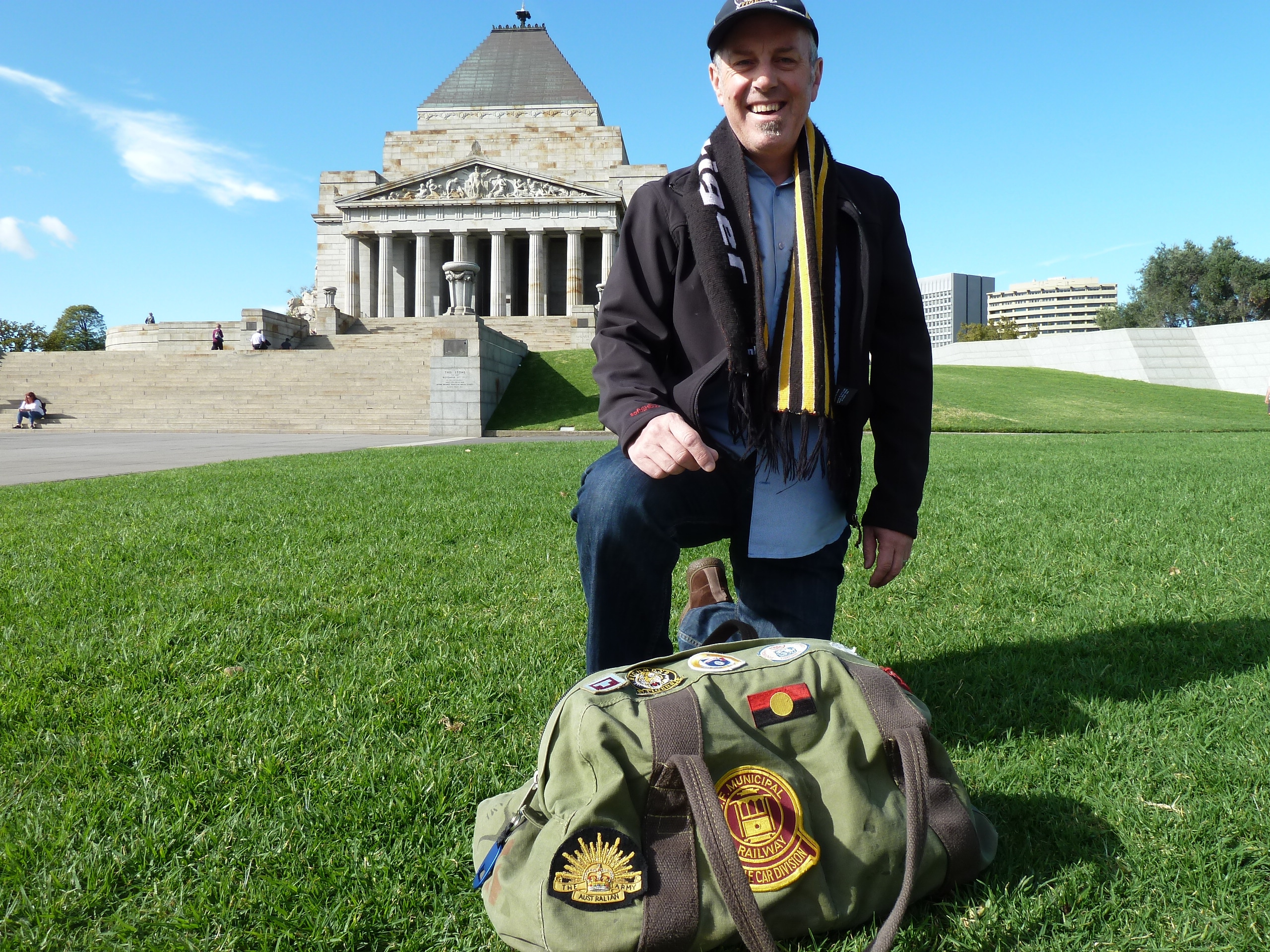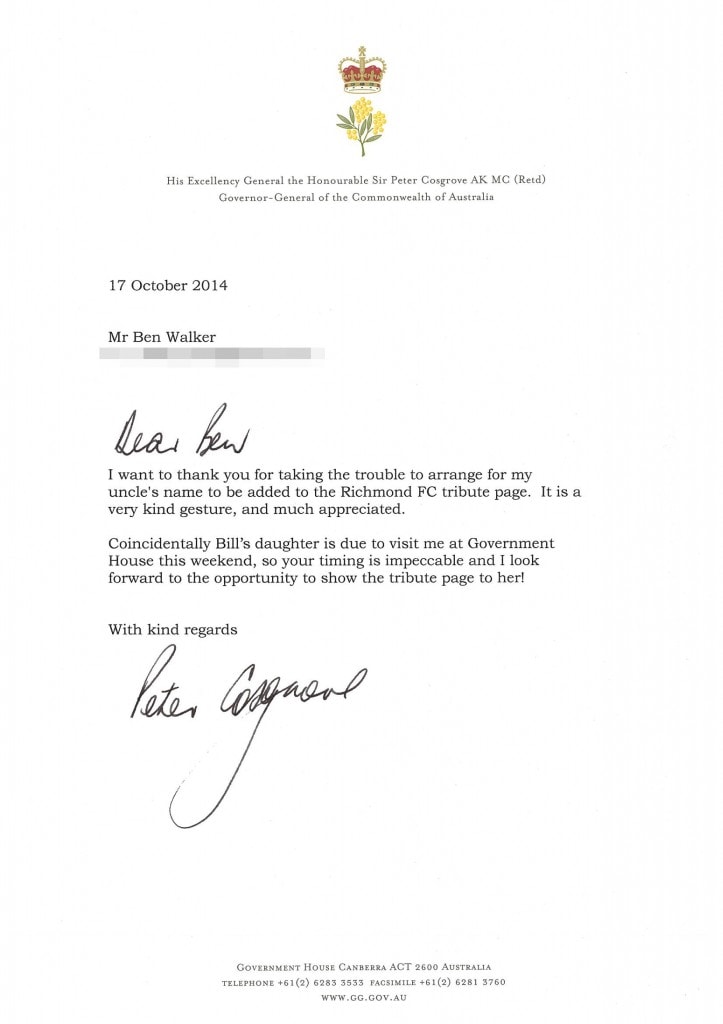Oh we're from Tigerland
Stories of being Richmond
Ben Walker, 51, West Hobart
Favourite all-time player:
Brendon Gale – “I always liked Benny Gale. A towering forward and he could kick goals. I remember one day his contact lenses were playing up, but he still took a clutch mark and kicked the goal. A thinking man’s footballer, and he’s a Tasmanian, and I liked his brother.”
Favourite current player:
Tyrone Vickery – “It’s actually Bachar but I want to encourage Ty Vickery, so I’ll say Ty. I’ve always liked Ty and I think he’s got great potential and a lot of upside. He’s got some of the tricks. I think he’s learnt a few lessons about self-management.”

Fighting Tiger: Ben Walker, a Richmond fan, ex-Army, a board member of RSL Tasmania, on the green grass by the Shrine with his trusty old duffle bag.
“You have to rely on each other in infantry,” says Ben Walker, a Tigers’ man, a barracker, visiting from Hobart, who knows about teamwork under pressure. “You all share the same privations. But a well-run unit is a tremendous place to be. There’s a real zing and a vibe. It’s probably analogous to a well-run footy team, all working for common goals, all with a specialist role.”
I meet Ben at the Shrine of Remembrance early on a Sunday morning, after a loss, to talk about military commemoration and football, wondering what each might mean. He talks proudly of his years in the infantry – the camaraderie of being a foot soldier – and I think of our Richmond players, the screws tightening on them, wondering how they might respond in adversity. Brave hearts are needed.
Sing the song, boys, honour the words:
If we’re behind then never mind,
We’ll fight and fight and win.
Ben’s Richmond story begins in nearby Fitzroy, where he was born and raised a Tiger. “There was never any option, it’s in the DNA,” he says. “All my extended paternal family from Ballarat are Richmond.”
His late grandfather, Bill Walker, a travelling draper by trade, and coach of Gordon, east of Ballarat and playing in the Central Highlands Football League, was a Richmond scout in the 1930s to 50s. On the road, he visited games in the Wimmera and Western District, looking for talent. When in Melbourne, he visited the Richmond change-rooms, talking his way through the crowd, introducing his son – Ben’s father – to Jack Dyer.
As with most of his generation, the apogee of Ben’s life as a Tiger was the 1980 Grand Final, where he sat in the cheer squad among all the floggers and patty dukes, joining in the chants. “An elixir for a 16-year-old,” he says. “We all fought to have the most badges and name-plates on our duffle coats. These were our warrior-heroes, and Richmond had some jet players.”
It was a heyday of the Victorian Football League, when attendances spiked (in 1981, home-and-away crowds averaged 25,409, numbers that wouldn’t be bettered until 1992, when West Coast won their first flag) and football was still a Saturday afternoon suburban pastime.
“We caught the train and bus to Arctic Park, we traipsed to Victoria Park, Windy Hill, Moorabbin, all the footy grounds.”
Ben rowed in those days, for the Richmond Rowing Club, whose top had a yellow sash, and where a footballer from Punt Road was a semi-regular. “I saw Jimmy Jess row there a few times,” he says. “I loved the Ghost. He had an ethereal feel about him. But he did the job when required.”
Ben’s military connection began in the Australian Army Reserve in the Melbourne University Regiment, an officer training unit, with stints in infantry, and the medical and psychology corps. From 1983, Puckapunyal became a backyard and his respect for infantry was forged.
“It’s often said you’re either infantry or infantry support because you generally don’t win battles with tanks, or with signals or logistics,” he says. “It’s troops on the ground. It’s the hardest life, you have to take and hold terrain in all weather, you’ve got to have personal courage, resilience and fortitude.”
On a Sunday morning, by the clipped grass and formal pathways of the Shrine, I ask Ben about the connections between military engagement and football. He chooses words carefully. “It’s ritualised warfare without the stakes,” he says. “It’s simulated warfare, especially in a team sport as brutal as ours, but ultimately it’s entertainment and recreation.”
He says he appreciates how for many, including those who’ve served abroad, the two are blood brothers.
Two years ago, mindful of this link, Ben nominated William (‘Bill’) Cosgrove for a Richmond tribute webpage called the Virtual Duffle Coat, created by Tigers fan, Chris Rees. Bill played three matches for Richmond in 1940 (for three wins) before enlisting as a bomber pilot in WWII, in a story chronicled on richmondfc.com.au by Tony Greenberg. In brief, Bill flew combat missions in North Africa and the South Pacific in Bristol Beaufighters, each blessed by carrying the name of his team mate and hero, Jack Dyer, on their fuselage, alongside a snarling tiger painted on the nose, and the words ‘Eat ’em alive’.
.jpg)
Fallen Tiger: eternal commemoration of Flight Sergeant Bill Cosgrove on the Virtual Duffle Coat created by Richmond fan Chris Rees from crowd nominations.
Born on Armistice Day in 1918 – hence his middle name of Pax, in Latin meaning “kiss of peace” – Bill’s life was bookended, tragically, by war. He was shot down in 1943, over New Guinea. He was 25. He would never play for Richmond again.
Ben Walker knew of Bill Cosgrove, and knew his nephew is the former Australian Army commander and Chief of the Defence Force, Peter Cosgrove. Now the Governor General, he also knew that Peter is a Richmond fan, and was rightfully proud of his uncle whose life was cut short. So he wrote him a letter.
A few weeks later, a reply came from Government House, thanking him for arranging the commemoration. Both Ben and Chris Rees also received correspondence from Bill’s daughter, Madeleine, saying, “I am honoured to see my father’s name on the tribute, especially next to Jack Dyer who was his hero”.

Vice-regal consent: A letter from one Tiger to another.
Ben never served abroad, but knows some of the anxieties of a military life. “The difference between a civilian and service personnel is that someone in the services, even a pen-pusher, can potentially get in harm’s way.”
A simple distinction, between life and war.
This Sunday, after the lowering of the sun, our beloved Richmond plays the Melbourne Football Club in a now-traditional Anzac Day eve football game, honouring the commemoration. For many at the game, and watching elsewhere, minds will wander to other people, or places or times, to private connections many have with the military, both at home and overseas.
Uncles, grandfathers, brothers, sisters, husbands, wives. Gallipoli, Villers-Bretonneux, Tobruk, Kokoda, Korea, Vietnam, the Middle East, Afghanistan and elsewhere.
“The game should be evocative for the players and the crowd,” says Ben. “The bugles, dimmed lights and hushed arena conjure up war’s burden. Some never make it home, others who return are affected mentally or physically for years to come.”
In a match of football there is remembrance, and an honouring. Many of those who have died in service have been no older than the 44 footballers who’ll take the field this Sunday night. It’s a melancholy thought: young men, death, and a sobering national pride that follows the sorrow.
“Australia continues to have troops on active and peace-keeping services overseas,” says Ben. “Many of us have family or friends who’ve known military service. Sunday night is a moment to remember and reflect on war’s cost and the sacrifices made by our troops.”
Go Tiges!
If you would like to nominate a Richmond fan who has a story to tell about their barracking please email Dugald Jellie with details: dugaldjellie@gmail.com



